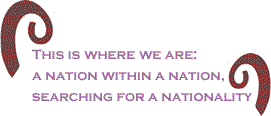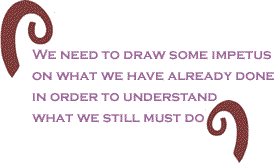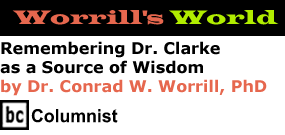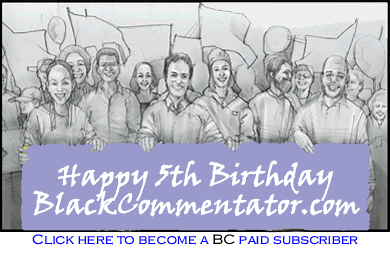
On Thursday, July 16, 1998, Dr. John Henrik Clarke
made his transition into eternity. Dr. Clarke was one of our
greatest African deep thinkers, historians, and educators in
the history of the African world.
The following is Dr. Clarke speaking in his own
words prior to his transition. This will be followed by a review
of his book, Notes For An African World Revolution: Africans
At The Crossroads, written by me in 1991.
“But, whiles I must make this physical
departure, spiritually,
I will not leave you and God will take care of
you. When you
feel a cool breeze blow across your face every
now and then,
just know that it comes from the deep reservoir
of love that I
hold for you. Oh, by the way, Christ is Black;
I see him walking
at a distance with Nkrumah. I think they are
coming over to greet
me.”
“My feet have felt the sands
Of many nations,
I have drunk the water
Of many springs.
I am old,
Older than the pyramids,
I am older than the race
That oppresses me.
I will live on…
I will out-live oppression.
I will out-live oppressors.
DETERMINATION”
John Henrik Clarke
July 16, 1998
Thousands and thousands of books are published
each year, but very few contain any wisdom that will help African
people, throughout the world, in our on-going liberation struggles.
However, this is not the case in the newly released book by
our renowned African scholar, researcher, and writer, Dr. John
Henrik Clarke. Dr. Clarke’s new book, Notes For An African
World Revolution: Africans At The Crossroads, is full of the
rich wisdom of his more than 55 years of active participation
in the worldwide African Liberation Movement.

This is the kind of book that will have to be read,
over and over again, to decipher all of its rich “source
of wisdom.” For example, Dr. Clarke states:
1. People rise and fall within the context
of the nation institution. When they lose the ability to master
and control the nation institution they lose their freedom.
This is where we are: a nation within a nation, searching
for a nationality.
2. Now, as a result of the Europeans’
rise to power, a revolution began in the world, one we must
now revolt against. To revolt against it, we must understand
how it began. How then did we lose our Africanness? What will
we have to do to regain it? How did we lose the concept of
nationness and develop a concept of dependency?
3. The most dangerous of all dependencies is
to depend on your powerful oppressor to free you and share power
with you, because powerful people never train powerless people
to take power away from them.
4. Here is something we do not understand today:
the nature of oppressed people preying on other oppressed people
in order to resist oppression.
5. When we use the term “Third World,”
we better use it carefully. Because there are a whole lot of
people in the Third World who, in order to ingratiate themselves
to the oppressor, would gladly become an “honorary”
oppressor where we are concerned.
6. Because we have not learned to practice, figuratively
speaking, the essential selfishness of survival, we should give
no piece of the pie until every member of our family has a piece
of the pie.
7. When we began to lose these nation lessons
we began to move deeper and deeper into a trap, into a trap
of dependency. And yet into that same trap came the ingredients
of liberation. We have not studied enough how the slaves in
the Caribbean took advantage of the poor quality of the British
craftsmanship.
8. This is where the revolt will begin, this
is where the whole concept of “let us be a nation again,
let us be a people again, let us build institutions again,”
began in Jamaica. We need to draw some impetus on what we have
already done in order to understand what we still must do.
9. After the Civil War and after the British
emancipation, when they discovered it was a phony, when they
discovered they hadn’t been emancipated— the Black
people had no jobs, had no housing, and they still had to go
back to the same plantations.
10. Freedom is something we must take with our
own hands and serve it with our own hands. If other people’s
hands serve it for us, other people’s hands can take it
away.
The above points of wisdom I extracted from this
most profound book by Dr. Clarke are just a few examples, among
many, of lessons he presents to us through his many years of
struggle.

There have been few African American men or women
since our forced capture and introduction into the western hemisphere,
who have dedicated their entire lives to study, research, writing,
and teaching about the history of the world. In reading this
book, the dedication and insights of Dr. John Henrik Clarke
come through loud and clear.
BC columnist Conrad W. Worrill,
PhD, is the National Chairman of the National Black United Front
(NBUF).
Click
here to contact Dr. Worrill.
|





































